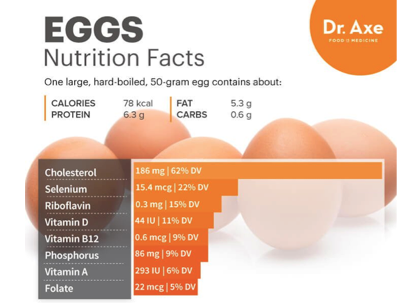A breakfast staple, eggs are enjoyed in different forms across the globe as a delicious and nutritious morning meal. But with health conscious lifestyles on the rise, it’s important to take a look at eggs from all perspectives. So what’s the truth behind the egg? Let’s find out.

Benefits of Eggs:
- Nutrients: Packed with proteins, vitamins, minerals, and essential fatty acids, the nutrients found within eggs promote everything from strong muscles (thanks to the 6 grams of protein per egg- which is 13% DV), to the regular functioning of cells which aid in the nervous system and memory, to a healthy immune system from the traces of Vitamin A, B-12 and Selenium. If you want to split hairs, egg whites contain slightly more protein than egg yolks. One large egg white contains 3.6 grams of protein — compared with 2.7 grams of protein found in egg yolks, according to the U.S. Department of Agriculture’s National Nutrient Database. Although egg whites are a source of dietary potassium, the yolks are rich in vitamin A, phosphorus, iron, zinc and vitamin D.
- Weight Management: While an egg breakfast can fill you up just right, one large egg only contains about 78 calories—meaning that the average breakfast of 2-4 eggs contains less than 240 calories. Served with fresh veggies, a meal of eggs can fill you up without making you go overboard on calories. Because of their high protein, studies show that meals which include eggs can help you feel full and will reduce food intake later in the day. On top of helping you feel satiated throughout the day, the essential amino acids that eggs are full of have been shown to boost your metabolism, making weight management a whole lot easier.
- Protect Against Disease: As mentioned above, eggs are filled with vitamins and nutrients that help the body function at the highest level and . Cholesterol aside, eggs contain some unsaturated fats, associated with a lower risk of heart disease; also iron and a number of vitamins and minerals. And a new Finnish study — one not affiliated with the egg industry — even suggests that eating one egg a day could improve long-term cognitive function.
Negatives of Eggs:
- Bacteria: Starting off with the most common egg fear, we have to mention the potential contamination of salmonella. A disease causing bacteria frequently found on the outside and inside of eggs, salmonella can often emerge from raw or undercooked eggs. One of the most concerning things about this, is that this foodborne illness is invisible—meaning that picking out the good from the bad is near impossible. Symptoms that can occur include diarrhea, fever and cramping, and can potentially be life threatening to older adults, infants or those with weakened immune systems.
- Food Miles: As a quick run-down, food miles are the miles over which a food item is transported from producer to consumer. Though many of us don’t think about how our grocery items get from where to where, food miles are a huge contributor to environmental issues we are faced with today. Unfortunately, the average grocery store egg travels about 1,956 miles—which is lot of carbon emissions that need to be factored in.
- Ethics: The biggest, most controversial issue regarding eggs is in the production process. The treatment of chickens as a tool for production rather than as a sentient animal is cause for much discussion regarding the purchasing of eggs from Egg farms. Egg production includes several unethical practices that are cause for concern for those of us who are working towards a sustainable and ethical lifestyle.
More egg pros and cons can be found at:
http://www.npr.org/sections/thesalt/2017/03/06/518152471/unscrambling-the-nutrition-science-on-eggs
Overall though, the health aspects regarding eggs lean more in favor of “healthy” than “unhealthy”. Of course, any kind of agriculture has an impact on the environment, and the morals and ethics behind our food purchases should always be considered. While we consider eggs to be a healthy source of vitamins, minerals and nutrients, there are a few ways to be more sustainable in your egg-deavors… Here’s how:
How to be a Sustainable Egg Eater:
- Purchase Free Range, Cage Free: A free-range chicken is allowed constant access to the outdoors, with room to spread their wings. One of the most disappointing aspects of the egg industry is the minimal space and room Chickens are given, and how little access they have to the outdoors. By purchasing free-range eggs, you are voting with your dollar for more ethical treatment of chickens.
- If You’re Feeling Ambitious, Start Your Own Chicken Coop: While purchasing free range and cage free is better than nothing, staring up your own chicken coop is all the rage. By maintaining your own “happy hens,” you’ll ensure they are eating the most quality food, are exposed to the least amount of chemicals, and are treated ethically.
- Support Your Local Farmers: Our last tip is based on supporting local farmers to not only support the local economy, but to reduce food miles. As mentioned above, food miles are a major contributor to CO2 emissions, and by purchasing your eggs from a local farmer, you know there is as little fuel as possible going into your morning breakfast.
 Food
Food Farmers
Farmers Sustainable Living
Sustainable Living Living Planet
Living Planet News
News